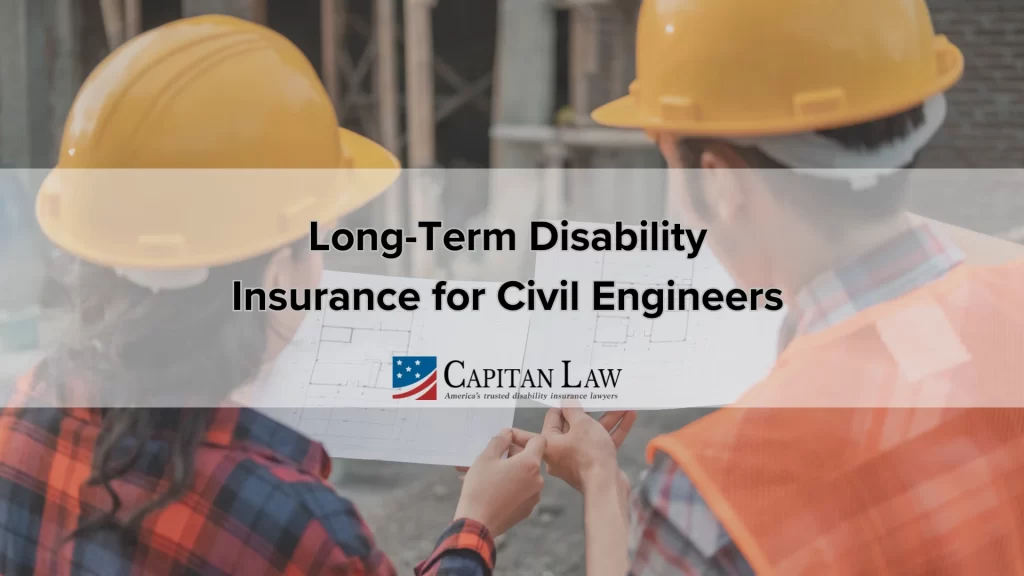
Long-Term Disability Insurance for Civil Engineers
Whether you’re designing bridges, shaping roads, or constructing buildings, your work as a civil engineer brings our world to life. But along with these exciting challenges come uncertainties and risks. What if an illness or injury were to keep you from doing the work you love? Are you prepared to lose months, maybe even years, of income?
The long-term disability attorneys at Capitan Law understand the challenges facing civil engineers better than most. No matter your occupation, our goal is to guide you through the intricacies of long-term disability insurance and provide clarity and support when you need it the most. With offices in Pennsylvania and Kentucky, we represent clients nationwide, with a particular focus on clients in Kentucky, Pennsylvania, and New Jersey. Call (267) 419-7888 today or fill out our contact form for a consultation.
What Is Long-Term Disability Insurance?
The main purpose of long-term disability insurance is to replace a portion of your income if you cannot work for an extended period due to a disability. It’s there to help you maintain your lifestyle and meet your financial obligations, like paying your bills, supporting your family, and meeting your life goals.
Remember that this insurance isn’t only about work-related injuries or accidents—it can also cover disabilities resulting from illnesses outside your job. So, whether you’re facing a health condition like heart disease or a severe accident, long-term disability insurance is there to provide financial support.
 Common Benefits of Long-Term Disability Policies
Common Benefits of Long-Term Disability Policies
Long-term disability insurance isn’t just about covering your income—it comes with various benefits designed to support you during challenging times. Let’s look at some of the most common ones:
- Income Replacement: This is the primary benefit of any long-term disability policy. If you cannot work due to a disability, these policies can replace a portion of your lost income, typically between 50% to 60% of your pre-disability earnings. This support helps you maintain your lifestyle and meet your financial commitments.
- Rehabilitation Services: Many policies include coverage for rehabilitation programs. These services aim to help you recover from your disability and get back to work safely and effectively.
- Vocational Training: If your disability prevents you from returning to your previous role, some policies may cover vocational training. This support can help you learn new skills or switch to a different line of work that’s better suited to your situation.
- Cost of Living Adjustments (COLA): Some long-term disability policies offer a COLA feature. This adjusts your disability benefits to account for inflation, helping your benefits keep pace with the rising cost of living.
- Survivor Benefits: If the insured person passes away while receiving long-term disability benefits, some policies provide a survivor benefit. This is a lump sum payment made to the insured’s designated beneficiary, offering additional financial support during a difficult time.
- Mental Health Coverage: Some policies extend their coverage to include disabilities resulting from mental health conditions. This recognition reflects the growing awareness that mental health is as critical to our well-being as physical health.
Workers’ Compensation vs. Long-Term Disability Insurance
Understanding the differences and similarities between workers’ compensation and long-term disability insurance can be crucial in determining which protection is most suitable for you. Here’s a look at how these two safety nets compare and contrast:
Similarities
- Income Replacement: Both workers’ comp and long-term disability insurance aim to replace a portion of your income if you cannot work due to an injury or illness. This support helps ensure financial stability during challenging times.
- Medical Benefits: Both coverages can help pay for medical expenses related to your injury or illness. This could include everything from hospital stays and surgeries to medications and physical therapy.
Differences
- Work-Related vs. Non-Work-Related: Workers’ compensation covers injuries or illnesses on the job or as a direct result of your work activities. Long-term disability insurance, however, covers disabilities regardless of where or how they occur.
- Coverage Duration: Workers’ comp benefits typically last until you can return to work or have reached maximum medical improvement. On the other hand, long-term disability insurance can provide benefits for a set number of years (e.g., 5, 10 years) or until a specific age (e.g., 65), as defined in your policy.
- Income Replacement Percentage: Workers’ comp generally replaces a higher percentage of your income (often around two-thirds), and these benefits are usually tax-free. Long-term disability benefits typically replace 50% to 60% of your pre-disability income and may be taxable or tax-free, depending on how the premiums were paid.
- Eligibility: States typically require most employers to provide workers’ comp for their workers. Long-term disability insurance, on the other hand, may be offered by some employers, or you might choose to purchase an individual policy.
- Legal Rights: If your employer denies a workers’ comp claim, you might have the right to dispute that decision through your state’s workers’ compensation board. With long-term disability, you may have the right to file a lawsuit if your claim is unjustly denied.
Common Issues With Long-Term Disability Claims
The long-term disability claim process can be complex, and you might encounter hurdles along the way. Let’s discuss some of the most common issues that civil engineers face in long-term disability claims:
- Insufficient Medical Evidence: Insurers need substantial proof that your disability is severe enough to prevent you from working. Your claim could be denied if the medical records and doctors’ reports are insufficient or unclear. It’s essential to work closely with your healthcare providers to ensure they accurately and comprehensively document your condition and its impact on your work capacity.
- Pre-existing Conditions: Many long-term disability policies exclude or limit coverage for disabilities related to pre-existing conditions. If you have a health issue that existed before your coverage began, the insurer might deny your claim based on this exclusion.
- Definition of Disability: Policies can define disability in different ways. Some cover you if you can’t perform your specific job, while others only provide benefits if you can’t work in any job that fits your education and experience. If the insurer believes you can perform another job, they might deny your claim.
- Failure to Meet the Waiting Period: Most policies have a waiting period (also known as an “elimination period”) before benefits start. If you file your claim before this period has passed, your claim could be denied.
- Failure to Continue Treatment: Most policies require you to continue appropriate medical treatment for your disability. The insurer may deny your claim if you fail to follow your doctor’s treatment plan.
- Surveillance and Social Media: Insurers might use private investigators or social media to check on your activities. If they find evidence suggesting you’re not as disabled as you claim, they may deny your benefits.
Despite these potential challenges, remember that help is available. Our law firm is here to guide you through this process, advocate for your rights, and help you overcome any hurdles in your path to securing the benefits you deserve.
Our Disability Lawyers for Civil Engineers Can Help With Your Claim
It’s frustrating when you encounter issues with a long-term disability claim, but our long-term disability attorneys can help you recover the money you need during this challenging time. We can gather your medical records and other evidence to include in the initial claim. Our team will review your policy’s terms and explain anything you don’t understand. Also, we can handle any appeals if an insurer denies or delays your claim. Finally, our lawyers will take your case to court if necessary. No matter how bleak things seem, we’re here to provide support and guidance. Call (267) 419-7888 today or reach out online for a consultation.
Related Posts:
 Common Benefits of Long-Term Disability Policies
Common Benefits of Long-Term Disability Policies